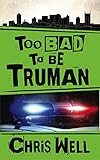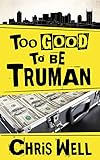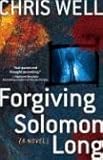|
Chris Well interview with Susan Sleeman
|
|
May 16, 2007
Through my career as a magazine editor and writer, I became acquainted with the acquisitions editors at a certain publisher. At the time, I was editor-in-chief at a particular magazine company, responsible for five or six different magazines – one of which covered Christian books. In one conversation with these folks, one of them remarked that I should consider writing a novel – it was, after all, his job to seek out what he considered good prospects. Although intrigued with the idea, I was too busy at the time to really pursue it. But over the next few years, he and I would occasionally discuss the suggestion, and I would even mention some of the various ideas percolating in the back of my head. Most of the time, he would accuse me of being “too cool for the Christian market.” Cut to 2002. I was a newlywed, married only six weeks when my employer closed the doors and I was laid off. I suddenly had a lot of time on my hands. As you can imagine, I was scrambling for any job possibility I could find – including several possible freelance projects. And I was able to call up my friend the acquisitions editor and really discuss the possibility in earnest. Not that I was a shoo-in: Even at that point, it was a good 16 or 17 months before he thought I had something he could present to the publishing committee. How has being a published novelist differed from your expectations of the profession? I didn’t expect to love it quite this much. When I started, becoming a novelist was a way to build a platform to get into writing for other media. But now I find myself considering writing for other media simply to draw more attention to the novels. What other jobs have you held (do you hold) and how have they helped you in your writing? For most of the past 13 years, I have been a full-time magazine editor. I have also written for radio, comics, newspapers – a lot of different kinds of writing. Any kind of writing and editing is good for sharpening your skills. And stretching different writing muscles expands your palette. Where do you find your inspirations for your plots? Any place: Items in the newspaper; incidents from real life, both witnessed and also overheard; even stories in other media. I find myself constantly playing “what if” with pretty much any information that passes through. The originality rarely is found in the core idea, it comes with how it plays out. And once I get into it, I find the story begins to move in directions I never would have expected when I started out. One of your strengths IMHO, is your character development and real dialogue. To what do you attribute your skills in creating such real life characters? My background in radio and radio dramas is a big help with the dialogue. (This goes back to the benefits of “stretching different writing muscles.”) My dialogue is likely also driven by a love of the old screwball comedies – especially those in the ’30s and ’40s starring Cary Grant. Man, the dialogue in those things is razor sharp! The character development is something I am still striving to improve. There were a couple of key pieces of advice that I received from my first publisher: Back when I was first working on my sample chapters, there was a scene where a couple of mob soldiers come in to deliver to a piece of news to their boss. The acquisitions editor said to give the scene more of a personal touch. So I rewrote the scene to where the soldiers, Holland and Sallis, are now having this discussion of a Broadway musical based on an old movie – and, as the characters developed, they ended up having this running conversation about pop culture and literature and old TV sitcoms. In fact, in my original plans for Forgiving Solomon Long, I don’t think I intended to have any funny scenes. But these guys became very much like the comedy relief characters you see in Shakespeare. (Which, since the entire mob family story was based on King Lear, was oddly appropriate.) The second piece of advice came from my editor on the book itself. He told me that a character is no more than a piece of furniture unless you imbue them with traits and context. The introduction of Detective Charlie Pasch was greatly improved by this advice. I am also as influenced by the rhythm of novels by masters like Elmore Leonard and Ed McBain. You are known for humor in your work. Successful at it too, I might add. Do you consider yourself overtly funny as in a stand up comedian kind of way or would I find you to be more dry and witty in person? I am usually reserved when I meet people. But once I get warmed up, I do have a tendency to shoot off my mouth. On a few occasions, I have been compared to Kevin James (“King of Queens”). As you know our website is devoted to Christian Suspense. What changes do you see coming in this genre? Any break out novelists we should watch for? The last few years have seen an explosion in styles and opportunities for the Christian reader who loves suspense and thrillers. Ted Dekker and Brandilyn Collins and Colleen Coble and Tim Downs have done a great job of expanding the expectations of the audience – and what publishers (and retailers) are willing to try. The folks to watch right now include T.L. Hines, Robert Liparulo, Kathryn Mackel, Creston Mapes, Melanie Wells, and Eric Wilson. Actually, there are quite a few worth watching. Do you think Christian Suspense is too segregated and should be marketed more in the secular world? If so how? That is a fine, fine question. But one I am still struggling with myself, so I don’t know that I have an answer for you. If your readers could take away only one message from Tribulation House, what would that be? “Don’t get distracted by conspiracy theories. Keep your eyes on Jesus. All the rest will work out in His timing.” You employ multiple points of view in Tribulation House. What were your deciding factors in mixing them in this novel? When I started out, the main reason to have Mark Hogan tell us his story himself was simply to make it clear that this was his story. (Hence his emphatic, “This is my story. Don’t let anyone tell you different.”) I wanted to make sure everyone really focused on his journey. The idea of the surprise ending – who he was really telling the story to, and why he was telling it — came to me much later in the process. (And, for those who have read Tribulation House: yes, the reveal was inspired by a famous trick of Agatha Christie’s. I just played it in reverse.) As for the various subplots, all three of these Kansas City novels have been ensemble stories, so this was just following that pattern. And it made sense to me to do those all in the third person ? again, to make sure that the center ring was always about Hogan. What are you working on now? My wife and I are co-writing a few projects, including a novel and a novella. In fact, at this EXACT MOMENT, she is entering corrections in the novella, our first story in a new mystery series. The novel is a big action/adventure romantic suspense whodunit starring a hotheaded female protagonist. I don’t want to give away too much, but it is probably the wackiest fiction I have written yet. What’s God been doing in your life lately? Every day I am amazed (again) by how the Lord has given me such an amazing wife. I could not do any of this without her support. I am also thrilled all the great things going on at my church home, Bethel World Outreach Center. Bringing it back to my life as a novelist, the Lord has also recently been connecting me with various people who can help me better navigate this crazy world of publishing. I’m looking at your bookshelf? What books, authors, do I see? We have bookshelves all over the apartment, so it depends on which particular set you’re looking at. In our “mystery/crime fiction” bookcase, you can see that I have really become enamored with the classic mysteries: from Sir Arthur Conan Doyle and G.K. Chesterton to Agatha Christie and Ellery Queen to Rex Stout. In fact, I have been haunting the used book stores in the area for out-of-print classics. That same case also holds a lot of our books from the pulp era – Hammett, Chandler, Cain, Goodis. And some volumes on the history of the genre. That particular case is rounded out by modern writers, Elmore Leonard, Michael Connelly, Ed McBain, James Ellroy, Victor Gischler, and the like. We also have bookcases overloaded with books on religion, TV and film, comics and graphic novels, and classic literature. (Not to mention all the shelves of DVDs and DVD box sets.) Do you have a scripture verse that expresses your writing message? “Do you see a man skilled in his work? He will serve before kings; he will not serve before obscure men.” — Proverbs 22:29 Any advice for unpublished writers? (See above.) I have seen many a wannabe get caught up in waiting until after his or her big break to start working at the craft. Those are the folks who will never make it. |
Warning: getimagesize(https://www.thesuspensezone.com/wp-content/uploads/2014/08/susanamazon-200×300.png): failed to open stream: HTTP request failed! HTTP/1.1 406 Not Acceptable
in /home/susans16/thesuspensezone.com/xxss_class/Utils.class.php on line 849
Warning: Division by zero in /home/susans16/thesuspensezone.com/xxss_class/Utils.class.php on line 856

 Chris Well is an award-winning writer and magazine editor whose fiction has appeared in Alfred Hitchcock’s Mystery Magazine. His whodunit mysteries starring senior sleuth Earl Walker include NURSING A GRUDGE, BURYING THE HATCHET, and KNOCKING ‘EM DEAD.
Chris Well is an award-winning writer and magazine editor whose fiction has appeared in Alfred Hitchcock’s Mystery Magazine. His whodunit mysteries starring senior sleuth Earl Walker include NURSING A GRUDGE, BURYING THE HATCHET, and KNOCKING ‘EM DEAD.
In May 2007, his laugh-out-loud crime thrillers Forgiving Solomon Long (one of the American Library Association’s top novels of 2005), Deliver Us >From Evelyn, and Tribulation House were simultaneously ranked the top three most discussed books on the Web by Technorati, which tracks more than 250 million pieces of social media.
He and wife Erica live in Tennessee, where he is supposed to be working on his next novel(s).




 Hi, Chris. Thanks for taking the time to answer my questions. Let me start with asking you to share the highlights of your professional writing career including how you got your first writing break?
Hi, Chris. Thanks for taking the time to answer my questions. Let me start with asking you to share the highlights of your professional writing career including how you got your first writing break?


Leave a Reply